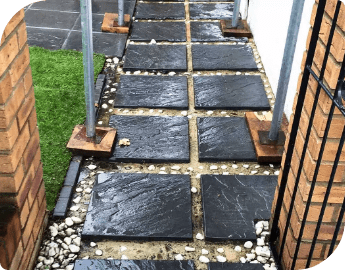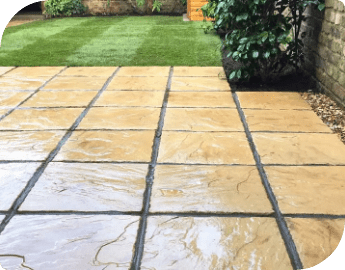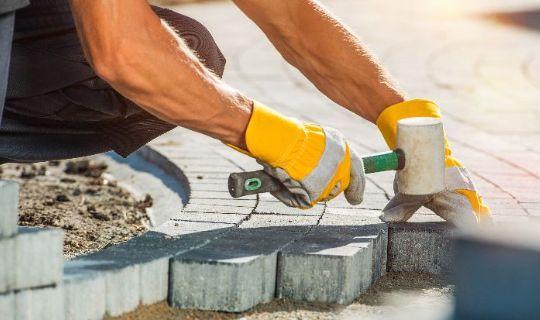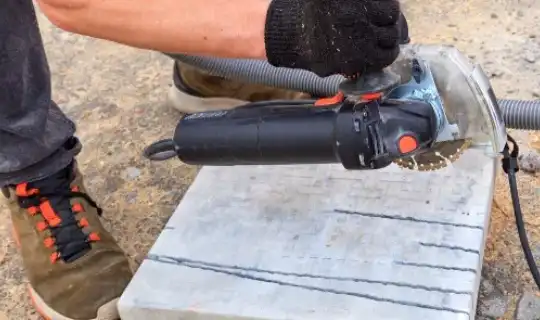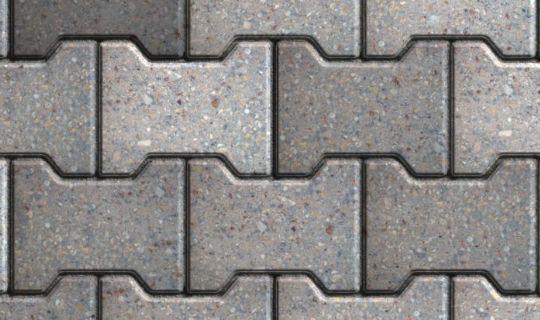What are the steps to make changes to my booking?
The most time-saving way to reschedule or cancel a service with us is to do it through your personal Fantastic account. Register today and login whenever you wish to update your booking.
What type of paving slabs can you work with?
We can practically lay all types of pavings, but the most common slabs our customers want are limestone, Indian sandstone, block paving, and bradstone. The paving experts can also lay Victorian paving, if requested.
How much does it cost to convert front garden to driveway?
The cost to convert a front garden to a driveway in the UK varies widely depending on the size of the area, the chosen paving material, the amount of excavation and clearance required, and whether new drainage systems or a dropped kerb are needed. This process involves significant groundwork, including preparing the base and laying an an anti-weed membrane. Our service begins with a survey to provide a personalized quote that encompasses all aspects of converting your front garden into a pristine and welcoming driveway.
How much does it cost to get paving done?
The cost to get paving done depends on several key factors, including the size of the area, the type of paving slabs chosen (e.g., Indian sandstone, block paving, Victorian paving), the complexity of the design, and any necessary site preparation like clearance or soil excavation. Our service provides a personalized quote after a surveyor takes measurements and discusses your project, ensuring transparent pricing for the labor and materials involved.
What type of paving is best for a driveway?
The best type of paving for a driveway depends on your budget, aesthetic preference, required durability, and drainage needs. Popular options include concrete block paving, known for its versatility in design and strength; resin bound surfacing, which is durable and permeable; and natural stone slabs like granite, offering a premium look. Our service provides bespoke work with experienced paving experts who can help you select the ideal material for your driveway to withstand vehicle traffic and enhance your property's curb appeal.
What paving lasts the longest?
The longevity of paving largely depends on the material chosen and the quality of its installation and ongoing maintenance. Highly durable options include natural stone (like granite or certain limestones), high-quality concrete block paving, and resin bound surfacing. When laid correctly on a properly prepared base, these materials can last for many decades, often exceeding 20-30 years, with minimal degradation. Our experts use robust methods, including laying anti-weed membrane and compacting a strong MOT base, to ensure your paving lasts.
What is the life expectancy of paving?
The life expectancy of paving varies significantly depending on the material, the quality of installation, and how well it is maintained. When laid correctly on a properly prepared base, high-quality paving, such as natural stone, concrete blocks, or resin bound surfacing, can last for many decades, often exceeding 20-30 years. Regular maintenance, including cleaning and re-pointing, helps to prolong its lifespan and ensure it remains durable and aesthetically pleasing for a long time.
What lasts longer, tarmac or block paving?
Both tarmac and block paving can be durable, but block paving generally has a longer lifespan and greater longevity when properly installed and maintained. Tarmac typically lasts around 10-15 years, while well-laid block paving can last 20 years or more. Block paving is also more adaptable to repairs, as individual blocks can be replaced without re-laying the entire surface, whereas tarmac repairs might be more visible.
Is porcelain paving better than sandstone?
The choice between porcelain paving and sandstone depends on priorities. Porcelain paving is highly durable, non-porous (making it stain-resistant and low maintenance), fade-resistant, and offers excellent slip resistance. Sandstone, a natural stone, provides a unique, traditional aesthetic, but it is more porous, requiring sealing to prevent staining and moss/algae growth, and may weather over time. Our experts work with a variety of paving slabs, including Indian sandstone, and can help you select the best material for your needs.
What is the best low maintenance paving?
The best low maintenance paving options are typically those that are non-porous and resistant to staining, fading, and weed growth. Porcelain paving is highly regarded for its minimal upkeep, as it doesn't absorb liquids and resists moss/algae. Resin bound surfacing also offers excellent low-maintenance qualities due to its permeable yet solid surface that inhibits weed growth. For block paving, using a heavy-duty anti-weed membrane and proper pointing significantly reduces maintenance. Our service uses quality materials and preparation steps, like anti-weed membrane, to save you hassle from future maintenance.
How should I maintain my new paving area?
Patio and driveway maintenance can be easily done with a jet washing machine. We do offer a pressure washing service, which is only done with water under high pressure. We don’t recommend the use of bleach and other strong chemicals to remove stains and dirt as this might damage the patterns of your paving and pollute your garden.
Can you lay paving over paving?
Generally, it is not recommended to lay new paving directly over existing paving. While it might seem like a shortcut, it can lead to instability, drainage issues, and a shorter lifespan for the new surface. Proper subfloor preparation is crucial for a successful paving job. The process typically involves clearing the area, removing old paving, excavating soil, leveling and compacting the base, and laying an anti-weed membrane before installing new slabs for a durable and lasting result.
Do I need a planning permission for my new patio or driveway?
No, you don’t need a planning permission, because the materials used for paving are permeable. Even if they are not permeable, the drainage will be directed to a lawn or to another permeable surface instead.
Will weeds grow in between the slabs?
As a reputable paving company in London, we always lay a heavy duty anti-weed membrane before we lay the base for the paving. It prevents weeds from growing in between the slabs.


